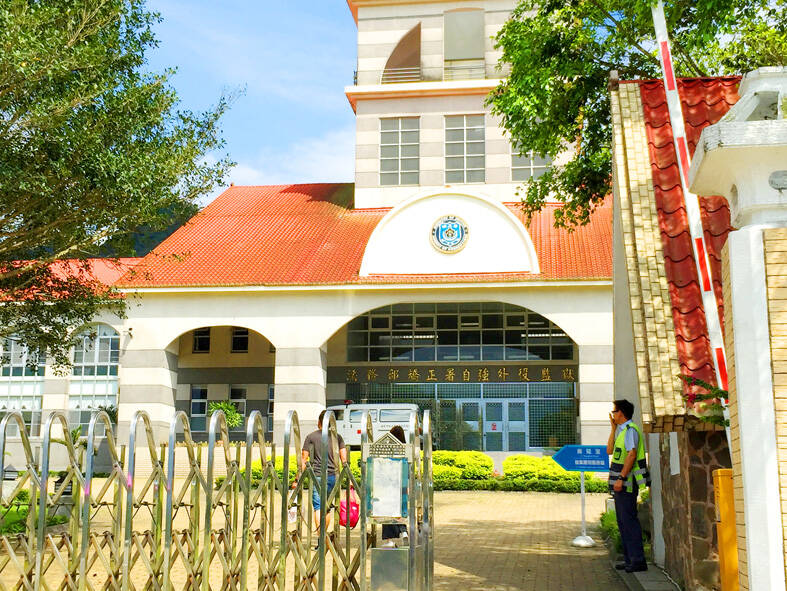The Ministry of Justice (MOJ) yesterday called for the immediate passage of a bill to make it harder for prisoners to be transferred to minimum-security facilities amid controversy over a recent case that critics said was treated too leniently.
The ministry said in a statement that the Agency of Corrections last year proposed an amendment to the Statute of Open Prisons (外役監條例), which was approved by the Executive Yuan on Sept. 22 last year and the bill is now pending legislative approval to tighten the rules governing transfers to minimum-security prisons.
The ministry said it would continue to negotiate with all legislative caucuses in the hope that the proposal would be passed as soon as possible.

Photo: CNA
Controversy over the current act erupted after a murder convict surnamed Yi (易) was in March last year transferred to a minimum-security facility.
Yi was in June 2019 sentenced to nine years in prison for killing a police officer in a nightclub in September 2014. In January last year, he applied for a transfer to a minimum-security facility, which was approved by more than half of a committee of experts.
Yi’s case sparked an outcry among grassroots police officers, who said that the show of leniency was not fair to the slain officer.
Hon Hai Precision Industry Co (鴻海精密) founder Terry Gou (郭台銘), whose father was a police officer, criticized the move, saying on Facebook on Sunday that the officer died in vain, as the government has done nothing to protect the police, and the public should be angry.
Gou is widely believed to be preparing for a presidential run, although he lost the Chinese Nationalist Party’s (KMT) presidential primary to New Taipei City Mayor Hou You-yi (侯友宜) earlier this year.
Hou also said the government has failed to show it cared about the public’s feelings about the case.
Vice President William Lai (賴清德), the presidential nominee of the Democratic Progressive Party, said that convicts who received heavy penalties for the crimes they committed should fully serve their terms and not seek any easing of their punishment.
The ministry said it understands the public’s wish to amend the law and proposed the amendment to build a better social safety net.
The draft bill would tighten the eligibility rules for transfer to a minimum-security prison, excluding those convicted of major crimes such as murder.
Other disqualifying offenses would include people sentenced to at least 10 years in prison or convicted of jailbreaking, robbery, aggravated fraud, kidnapping and seriously harming an on-duty public officer, the draft bill says.
It also stipulates that prisoners in minimum-security prisons who fail to return on time after being granted temporary leave would be moved back to a higher-security facility.
Under the current law, prisoners are eligible to be vetted for transfer to a minimum-security prison if they are not convicted of sexual assault, drug-related crimes or prison breaks.
The ministry said it held a public hearing about the proposed amendment in December last year, while the Legislative Yuan’s Judicial and Organic Laws and Statutes Committee held two review sessions in October and December last year, but the amendment has yet to be approved.

MAKING WAVES: China’s maritime militia could become a nontraditional threat in war, clogging up shipping lanes to prevent US or Japanese intervention, a report said About 1,900 Chinese ships flying flags of convenience and fishing vessels that participated in China’s military exercises around Taiwan last month and in January last year have been listed for monitoring, Coast Guard Administration (CGA) Deputy Director-General Hsieh Ching-chin (謝慶欽) said yesterday. Following amendments to the Commercial Port Act (商港法) and the Law of Ships (船舶法) last month, the CGA can designate possible berthing areas or deny ports of call for vessels suspected of loitering around areas where undersea cables can be accessed, Oceans Affairs Council Minister Kuan Bi-ling (管碧玲) said. The list of suspected ships, originally 300, had risen to about

DAREDEVIL: Honnold said it had always been a dream of his to climb Taipei 101, while a Netflix producer said the skyscraper was ‘a real icon of this country’ US climber Alex Honnold yesterday took on Taiwan’s tallest building, becoming the first person to scale Taipei 101 without a rope, harness or safety net. Hundreds of spectators gathered at the base of the 101-story skyscraper to watch Honnold, 40, embark on his daredevil feat, which was also broadcast live on Netflix. Dressed in a red T-shirt and yellow custom-made climbing shoes, Honnold swiftly moved up the southeast face of the glass and steel building. At one point, he stepped onto a platform midway up to wave down at fans and onlookers who were taking photos. People watching from inside

Japan’s strategic alliance with the US would collapse if Tokyo were to turn away from a conflict in Taiwan, Japanese Prime Minister Sanae Takaichi said yesterday, but distanced herself from previous comments that suggested a possible military response in such an event. Takaichi expressed her latest views on a nationally broadcast TV program late on Monday, where an opposition party leader criticized her for igniting tensions with China with the earlier remarks. Ties between Japan and China have sunk to the worst level in years after Takaichi said in November that a hypothetical Chinese attack on Taiwan could bring about a Japanese

The WHO ignored early COVID-19 warnings from Taiwan, US Deputy Secretary of Health and Human Services Jim O’Neill said on Friday, as part of justification for Washington withdrawing from the global health body. US Secretary of State Marco Rubio on Thursday said that the US was pulling out of the UN agency, as it failed to fulfill its responsibilities during the COVID-19 pandemic. The WHO “ignored early COVID warnings from Taiwan in 2019 by pretending Taiwan did not exist, O’Neill wrote on X on Friday, Taiwan time. “It ignored rigorous science and promoted lockdowns.” The US will “continue international coordination on infectious